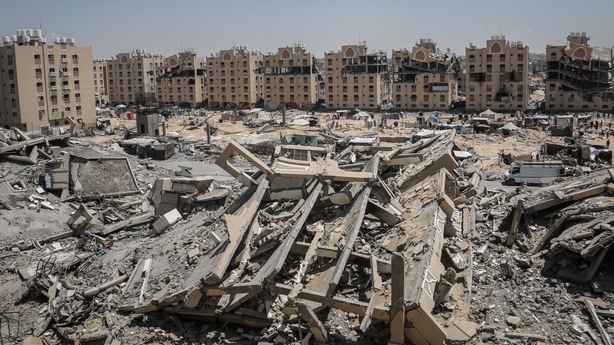The shock and horror experienced by Gazans in the first few weeks of the war has given way to exhaustion, frustration and hopelessness, according to the International Committee of the Red Cross (ICRC).
William Schomburg, the head of the ICRC sub delegation in Gaza, describes the harrowing conditions in Gaza as he steps down from the role he has held before and since the current conflict began in October 2023.
"I've worked in several conflict zones and the level of devastation is nothing I've ever seen before," Mr Schomburg told RTÉ News.
"I'm running out of adjectives to describe just how devastating the picture is in Gaza today. It's unprecedented, it's devastating, it's dehumanising," he added.
He said the biggest obstacle to the Red Cross providing humanitarian aid is the prevailing insecurity and unabated hostilities.
In the week marking the 75th anniversary of the signing of the Geneva Conventions, he said the parties to the war have failed to uphold their obligations under international humanitarian law to allow aid into Gaza.
His teams regularly face dangerous situations, and he lost two colleagues since the conflict began, though they were not killed while working for the ICRC.

In April, seven aid workers working for World Central Kitchen were killed when their vehicle was hit by an Israeli strike.
He described as "mind boggling" the logistical difficulties his teams encounter at border crossing, which prevents life-saving aid reaching those who need it.
"We need desperately more entry points," he said.
"We need a greater volume of assistance coming in and we need enough fuel for us to be able to make sure that the transporters can quite literally deliver."
He said bottlenecks at the Kerem Shalom crossing in particular have made it extremely difficult to supply the Red Cross field hospital in Gaza, which he said at times is so short of resources that it can barely remain operational.
Describing scenes at the hospital, Mr Schomburg became quite emotional saying: "To see children with double amputations and severe burns, civilians that are so clearly not part of the fight, is difficult."
He said Gaza was not an easy place to live before the war but that people still had hope.
"People had dreams. They had places of recreation. They had schools.
"Today there are no schools in Gaza and you have a population, 50% of whom is under the age of 18," he said.
The ICRC helped as a neutral intermediary in the process to release 105 hostages late last year.
The ICRC has no involvement in any negotiations, but Mr Schomburg is hopeful that a ceasefire deal will be reached because he said it is clear to everyone that this conflict has gone on far too long.






